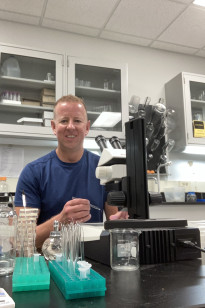

Office Hours
Dr. Mason is an assistant professor in the Biology Department and has been a Siena College faculty member since 2008. He completed a PhD in Biology in Dave Goldfarb’s lab at the University of Rochester in 2003. His thesis involved characterizing the overlapping and distinct cell biological functions the 3 importin alpha paralogs serve during Drosophila development.
In addition, Dr. Mason conducted 3 years of postdoctoral research in Doug Portman’s lab in the University of Rochester Medical Center, investigating the role of the DM-domain transcription factor DMD-3 in directing male tail morphogenesis in C. elegans. At Siena he has continued his work identifying cell biological and genetic processes that control male specific morphogenetic events in C. elegans. Dr. Mason maintains an active research program that incorporates between 6-10 undergraduate students each semester. Dr. Mason teaches General Biology I and II, Writing and Research Skills for Biologists, and is currently creating a new Developmental Genetics course.
| Degree | Program | University |
|---|---|---|
| Ph.D. | Biology | University of Rochester |
| M.S. | Biology | University of Rochester |
| B.S. | Biology | SUNY Geneseo |
My Siena Experience
My Teaching Philosophy
I think the biggest thing that makes a good teacher is caring deeply about your students. Everything else (giving clear and engaging lectures, being well-prepared, taking responsibility for your mistakes, providing a challenging and rigorous experience, etc) comes naturally if you care about how your students are progressing and learning.
What I Love About Siena
I truly love Siena’s students. I have found my students to be exceptionally dedicated to learning and not afraid to work hard in order to be successful. In addition, I love working with all my colleagues in the Biology Department (and Siena Faculty). I am surrounded by excellent teachers and dedicated researchers.
My Favorite Courses to Teach
Developmental Genetics, General Biology I and II.
My Professional Experience
| Year | Title | Organization |
|---|---|---|
| 2008 - Now | Associate Professor, General Biology | Siena College |
| 2007 - 2007 | Adjunct Faculty | St. John Fisher College |
| 2005 - 2008 | Postdoctoral Fellow, Dev. Genetics | University of Rochester |
| 2003 - 2005 | Postdoctoral Fellow, Cell Biol/Genetics | University of Rochester |
| 1996 - 2003 | Grad. Res. Assist., Cell Biol/Genetics | University of Rochester |
Current Research
The development of a single celled fertilized egg into a multicellular adult organism is a spectacularly complex process. One of the key events that must happen during development is that embryonic structures must be remodeled to generate the final shape of the adult organism. The process by which this occurs is called morphogenesis (the “birth of shape”). My research focuses both on characterizing the genetic and cellular changes that happen within embryonic cells during morphogenesis and understanding how these morphogenetic changes are regulated so that they occur at the correct time and in the correct place. To accomplish this, my research group uses C. elegans, a small nematode that can be found living freely in the soil. Specifically, we are work on identifying genetic and cellular processes that direct the morphogenetic events that generate the sexually dimorphic adult male body form.
Articles & Book Reviews
- Evolution of the metazoan-specific importin a gene family
Journal of Mol. Evol., vol. 68
2009 - . Drosophila importin a1 performs paralog-specific functions essential for gametogenesis
Genetics, vol. 178
2008 - dmd-3, a doublesex-related gene regulated by tra-1, governs sex-specific morphogenesis in C. elegans
Development, vol. 135
2008 - Increased nuclear envelope permeability and Pep4p-dependent degradation of nucleoporins during hydrogen peroxide-induced cell death
FEMS Yeast Res, vol. 5
2005 - Importin a: a multipurpose nuclear-transport receptor
Trends in Cell Biology, vol. 14
2004 - The Drosophila melanogaster importin a3 locus encodes an essential gene required for the development of both larval and adult tissues
Genetics, vol. 165
2003 - Drosophila melanogaster importin a1 and a3 can replace importin a2 during spermatogenesis but not oogenesis
Genetics, vol. 161
2002
Books & Book Chapters
- Nuclear Transport in Development and Disease.
2009